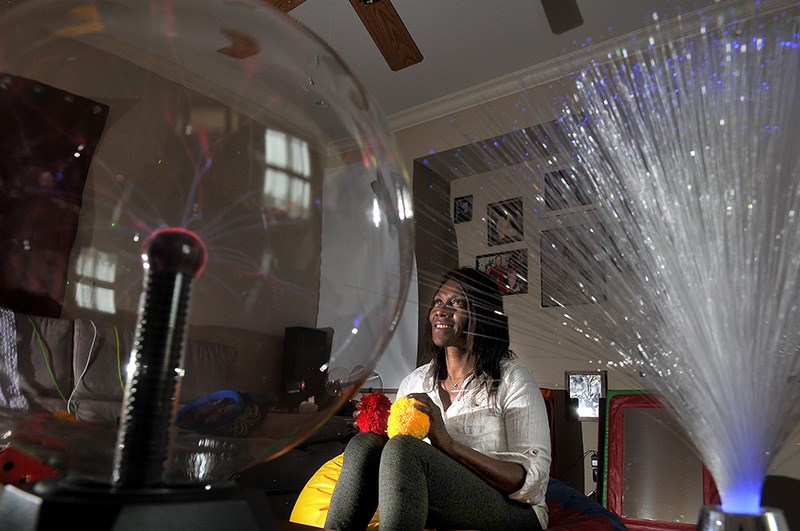From Wikipedia: "The term 'Snoezelen' (pronounced snuzələ(n)) is a neologism formed from a blend of the Dutch 'snuffelen' (to snuggle, also: to sniff) and 'doezelen' (to doze, to snooze). It was coined by Jan Hulsegge and Ad Verheul, who developed the concept while working at De Hartenberg Institute in the Netherlands."
A room filled with bean bag chairs, soft, fluffy balls, massaging slippers, sinewy fibre-optic lights and colourful plasma balls could soon be a new hangout in Port Moody — not for lapsed hippies seeking a return to the 1970s but children and adults with developmental challenges such as autism.
Debra Abraham, the executive director of the Unique Get Together Society (UGTS), is hoping to build such a room, called a snoezelen room.
A snoezelen room is the opposite of a sensory deprivation tank. Instead of relaxing inhabitants by isolating them from anything that could stimulate their senses — like light, sound, smells or touch — visitors to a snoezelen room are calmed by controlled stimulation of their senses with gentle music or recorded sounds of nature; multi-coloured points of light from fibre-optic lamps and floor coverings; soft, engulfing chairs; tactile toys; scents from essential oils; and comforting touch from massaging slippers.
“It’s about desensitizing the nervous system,” said Abraham, who founded UGTS after helping kids and their families for more than 20 years as a social worker. “People are overstimulated by all the bright lights and activity, so we have to slow the brain down.”
The snoezelen room accomplishes that by engaging and delighting the visitor, giving them an opportunity to focus and explore the components of the room at their own pace or to simply let the sensory stimulation wash gently over them.
The effect can help kids and adults break through communication barriers brought on by autism, help improve the quality of life for seniors with dementia and provide therapy for people with physical limitations.
“It benefits the members of the community who have barriers,” Abraham said.
“It’s a choice people need to have,” said Abraham of her quest. “People need a way to cope, and medication can only go so far.”
To prove its benefits, she has built a small snoezelen room in the living room of her Coquitlam home. External light and sounds are kept out by heavy blackout curtains that divide the space. In the darkness beyond, a sectional sofa is draped with strands of multi-coloured tube lights, end tables are topped with quietly-burbling water tubes, pulsing plasma balls and red, blue and green fibre-optic filaments. The calming sounds of a forest, chirping birds, a babbling brook, the breeze through the trees, sing softly from a portable CD player in the corner. Beanbag chairs, soft, fuzzy cloth balls and pliable plastic shapes are strewn about the floor and furnishings.
Abraham’s vision is grander than just a room in her house, though. She’s hoping to build a larger version of the room in a space closer to nature, where the transition from the calm interior to suburban hubbub won’t be as jarring. She said Port Moody’s proximity to parks and forests make it an ideal location.
To realize her dream of creating the room, UGTS recently hosted a fundraising gala at the Old Mill Boathouse in Port Moody. Abraham has also started a Go Fund Me page. As well, she’s dedicating her entry as the Western Canada representative to the Mrs. Canada Globe pageant in Regina, Sask. next February to help raise awareness and some of the $25,000.
• The crowdfunding page to help build a snoezelen room in Port Moody can be found at gofundme.com/a-room-to-help-children.



